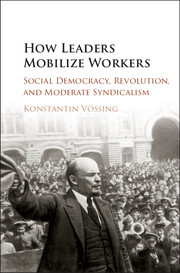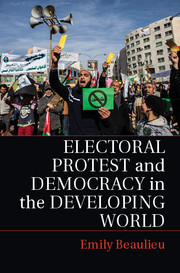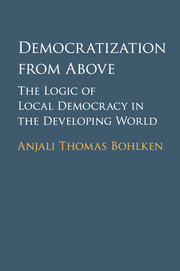Parties, Movements, and Democracy in the Developing World
Part of Cambridge Studies in Contentious Politics
- Editors:
- Nancy Bermeo, Princeton University, New Jersey
- Deborah J. Yashar, Princeton University, New Jersey
- Date Published: December 2016
- availability: Available
- format: Hardback
- isbn: 9781107156791
Hardback
Other available formats:
Paperback, eBook
Looking for an inspection copy?
This title is not currently available for inspection. However, if you are interested in the title for your course we can consider offering an inspection copy. To register your interest please contact [email protected] providing details of the course you are teaching.
-
This volume analyzes regime politics in the developing world. By focusing on the civilian, collective actors that forge democracy and sustain it, this book moves beyond materialist arguments focusing on gross domestic product (GDP), poverty, and inequality. With case material from four continents, this volume emphasizes the decisive role played by parties and movements in forging democracy against the odds. These pivotal collectivities are consistently the key civilian collectivities that successfully mobilized for democracy, that helped forge enduring democratic institutions, and that shaped the quality of the democracies that emerged; they are the ones tasked with mobilizing along a range of social cleavages, confronting seemingly inhospitable conditions, and coordinating the process of regime change. While the presence of parties and movements alone is not sufficient to explain democracy, their absence is detrimental to enduring democratic regimes. Thus, this volume refocuses our attention on parties and movements as critical mechanisms of regime change.
Read more- Explains the founding and survival of democracy against the odds, in developing regions that are poor and unequal
- Moves beyond purely materialist and class-based explanations of regime outcomes
- Theorizes and concentrates on the role of civilian collective actors (parties and movements) that forge and sustain democratic rule, especially in inhospitable conditions
Reviews & endorsements
'This book is an important contribution to the literatures on democratization, parties, and movements. The volume focuses on why democracy sometimes emerges in unlikely places and circumstances. The authors argue persuasively that parties and movements are the primary actors in creating and undermining political regimes, and that these actors' preferences and behaviors are not predictable on the basis of structural variables. The contributors are among the foremost scholars of the developing world …' Scott Mainwaring, Harvard University, Massachusetts
See more reviews'Contrary to long-standing expectations of modernization theory, democracy has spread to a large number of poor countries since the onset of the Third Wave. In Parties, Movements, and Democracy in the Developing World, the contributors address this phenomenon by focusing on the organizational, political, and ideational foundations of democratic change. They do not disregard the advantages of economic development; but they argue convincingly that the social movements and political parties that shape democratic change derive from historical legacies and political choices that cannot be mapped directly to underlying social structure. These arguments are set forth in an excellent framing chapter by the editors, Nancy Bermeo and Deborah J. Yashar, and are pursued in historical detail by noted specialists on India and Southeast Asia, Latin America, Sub-Saharan Africa, and the Middle East … the volume provides a coherent and sophisticated analysis …' Robert R. Kaufman, Distinguished Professor of Political Science, Rutgers University, New Jersey
'Parties, Movements, and Democracy in the Developing World makes a major contribution to the comparative study of democratization. Bermeo and Yashar make a compelling case that strictly materialist theories - which take for granted the centrality of class cleavages and class-based identities and organizations - are insufficient to understand democratization movements in the developing world. In Africa, Asia, Latin America, and the Middle East, class is but one of multiple cleavages around which actors mobilize. The chapters in this volume map out the diversity of collective organizations that make up contemporary democratization movements, and they provide new theoretical tools to understand the consequences of that diversity. The chapters take history seriously, showing how the organizational legacies of authoritarian rule and transitions shape subsequent party system and regime trajectories. I learned much from this book. It is required reading for anyone interested in regime change or party systems in the developing world.' Steven Levitsky, Harvard University, Massachusetts
Customer reviews
Not yet reviewed
Be the first to review
Review was not posted due to profanity
×Product details
- Date Published: December 2016
- format: Hardback
- isbn: 9781107156791
- length: 242 pages
- dimensions: 237 x 158 x 22 mm
- weight: 0.52kg
- contains: 7 b/w illus. 9 tables
- availability: Available
Table of Contents
1. Parties, movements and the making of democracy Nancy Bermeo and Deborah J. Yashar
2. The content of democracy: nationalist parties and inclusive ideologies in India and Indonesia Maya Tudor and Dan Slater
3. Social cleavages, political parties, and the building of performance legitimacy in Southeast Asia Erik Martinez Kuhonta
4. Democratic divergence and party systems in Latin America's third wave Kenneth M. Roberts
5. Strong parties, weak parties: divergent pathways to democracy in sub-Saharan Africa Rachel Beatty Riedl
6. Parties in transitional democracies: authoritarian legacies and post-authoritarian challenges in the Middle East and North Africa Ellen Lust and David Waldner
7. Mechanisms matter Nancy Bermeo and Deborah J. Yashar.
Sorry, this resource is locked
Please register or sign in to request access. If you are having problems accessing these resources please email [email protected]
Register Sign in» Proceed
You are now leaving the Cambridge University Press website. Your eBook purchase and download will be completed by our partner www.ebooks.com. Please see the permission section of the www.ebooks.com catalogue page for details of the print & copy limits on our eBooks.
Continue ×Are you sure you want to delete your account?
This cannot be undone.
Thank you for your feedback which will help us improve our service.
If you requested a response, we will make sure to get back to you shortly.
×






